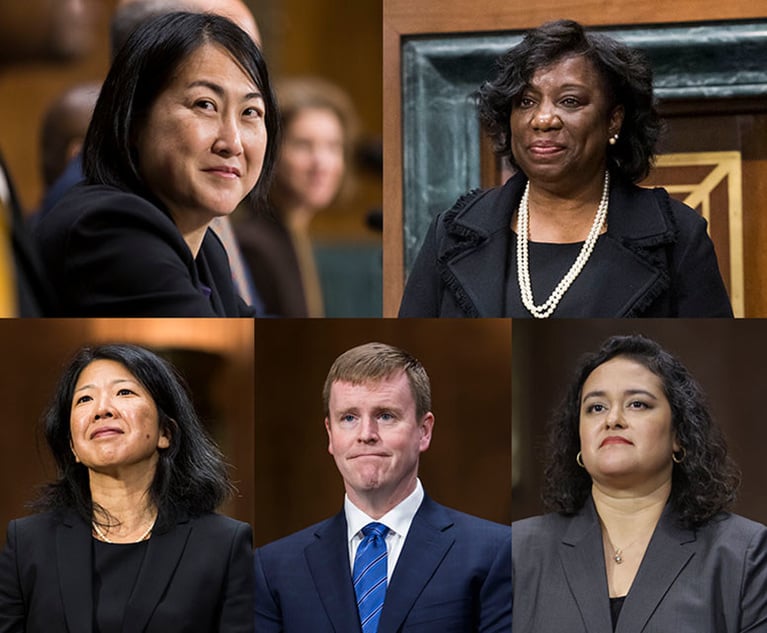 Michael Avenatti speaks to members of the media outside the federal court in New York on March 25, 2019. Photo: Louis Lanzano/Bloomberg
Michael Avenatti speaks to members of the media outside the federal court in New York on March 25, 2019. Photo: Louis Lanzano/BloombergFight Erupts Over Who Should Replace Michael Avenatti in Appeal of $454M Verdict
Among those filing motions Monday to replace Avenatti, who was charged with extortion and bank fraud last week, were the receiver and a former attorney at his firm who are pursuing a $10 million judgment against him. Separately, two former clients sued Avenatti and others for malpractice.
April 02, 2019 at 06:13 PM
6 minute read
Embattled attorney Michael Avenatti has agreed to step down as lead plaintiffs counsel of a class action in which he won a $454 million verdict, but a fight remains over who will replace him.
Avenatti, best known as the lawyer who once represented the adult film actress known as Stormy Daniels in her lawsuit against President Donald Trump, faces criminal charges of extortion and bank fraud. Prosecutors in New York and California filed the charges last week, and Avenatti, who appeared with his criminal defense team in the California case on Monday, has entered no pleas in either case.
On Monday, two lawyers working with Avenatti on the class action, brought against Kimberly-Clark Corp. over the cost of allegedly defective surgical gowns, filed a motion to appoint them as interim class counsel in light of the criminal charges. Avenatti submitted a declaration supporting them as his replacement.
But a receiver in charge of collecting on a $10 million judgment against Avenatti's law firm, Eagan Avenatti, filed a competing motion Monday for an “indicative ruling” to appoint Irvine, California's Frank Sims & Stolper as lead class counsel. It's not just any firm: One of its attorneys, Jason Frank, a former contract attorney at Avenatti's firm, is pursuing the $10 million judgment.
“EA no longer has any employees or attorneys besides Avenatti, nor does it have any money in its bank accounts or legal malpractice insurance,” wrote a lawyer for the receiver, Brian Weiss, referring to Eagan Avenatti. “As such, EA does not have the resources to continue to represent the class.”
The criminal charges in California alleged that Avenatti embezzled a $1.6 million settlement from a client trust account and provided false tax records to obtain $4.1 million in business loans from a bank in Mississippi.
“The government's allegations are consistent with documentary evidence reviewed by EA's receiver,” Weiss' lawyer wrote in Monday's motion. “Avenatti remaining as class counsel is untenable.”
According to court documents, the three name partners of Frank Sims all left Avenatti's firm in 2016. Andrew Stolper, according to court records, was a non-equity partner at Eagan Avenatti starting in November 2014, while Scott Sims, also a non-equity partner, began in February 2012. Frank began working at Eagan Avenatti in 2009. After resigning, Frank claimed Avenatti owed him millions of dollars in unpaid compensation as an independent contractor, according to court records.
Frank, Stolper and Sims, and Weiss' attorney, Jack Reitman of Los Angeles-based Landau Gottfried & Berger, did not respond to a request for comment.
Avenatti and the two attorneys he supported to replace him, William Hearon, of William C. Hearon P.A. in Miami, and Ahmed Ibrahim, of AI Law in Irvine, California, also did not respond.
According to court documents, the $10 million judgment comes from a settlement reached as part of Eagan Avenatti's Chapter 11 bankruptcy in Santa Ana, California.
On Sept. 4, Frank, under the creditor name of Jason Frank Law PLC, sought to enforce the judgment in federal court before U.S. District Judge Virginia Phillips of the Central District of California. Avenatti had attempted to disqualify Frank Sims & Stolper as Frank's counsel in the judgment action, given that Sims still represented him in a fee-sharing dispute tied to a $39 million settlement in 2011. Phillips rejected the disqualification.
On Monday, Avenatti's two former clients who got that settlement filed a malpractice lawsuit against him, his former and current law firm, and Michael Eagan, former partner at Eagan Avenatti, now in San Francisco. They also sued Frank, Sims and Alex Conti, a former Eagan Avenatti lawyer now at Conti Law in Newport Beach. The two former clients alleged in a complaint filed in Santa Barbara County Superior Court that one of the two other law firms that helped obtain the $39 million settlement, Los Angeles-based Stoll, Nussbaum & Polakov, had sued them to collect its share of $15.3 million in attorney fees that Avenatti had refused to pay them. The complaint says Avenatti transferred the fees from a client trust account to a business operating account.
In the judgment action, Frank Sims sought to appoint a receiver, citing Avenatti's failure to pay and “brazen acts of bankruptcy fraud,” such as failing to disclose contingency payments coming in from lawsuits. Avenatti stipulated to appointing Weiss as receiver on Feb. 13.
Among his firm's largest assets, according to the receiver motion, were more than $10 million in attorney fees and costs anticipated to come from the class action against Kimberly-Clark.
In that case, U.S. District Judge Dolly Gee reduced the award to $25 million. Kimberly-Clark and another defendant, Halyard Health Inc., have appealed the judgment, and Avenatti, on behalf of the class, appealed the judge's decision to reduce about $450 million in punitive damages to $20 million.
In an amicus brief, the U.S. Chamber of Commerce, the American Tort Reform Association and the National Association of Manufacturers challenged the punitive damages.
In his motion to replace Avenatti in the class action, Weiss wrote that the partners at Frank Sims worked on the case while at Eagan Avenatti and that Frank, as a creditor, “has the same economic incentive to maximize the value of the case on behalf of the class.”
Hearon and Ibrahim, in their motion, noted that they both had “significant roles” in the trial and were “intimately involved” in the appeal.
“There is thus no need for the court to make a wholesale change in the team of lawyers handling what remains of the appellate process,” they wrote.
Hearon and Ibrahim also filed notices of appearances on Monday before the U.S. Court of Appeals for the Ninth Circuit, alongside the plaintiffs' appellate counsel, Stuart Esner, of Esner Chang and Boyer in Pasadena, California. The Ninth Circuit has yet to schedule oral arguments in the case, which is fully briefed.
Hearon and Ibrahim, who left Eagan Avenatti last month to start his own firm, had the support of the class representative, Bahamas Surgery Center, and Avenatti, both of whom filed declarations.
“Out of an abundance of caution and to ensure that my fiduciary duties are met, I believe it is in the best interests of the class to relinquish my role as lead class counsel at this time,” Avenatti wrote in a declaration.
A hearing on Avenatti's replacement is set for May 3.
This content has been archived. It is available through our partners, LexisNexis® and Bloomberg Law.
To view this content, please continue to their sites.
Not a Lexis Subscriber?
Subscribe Now
Not a Bloomberg Law Subscriber?
Subscribe Now
NOT FOR REPRINT
© 2024 ALM Global, LLC, All Rights Reserved. Request academic re-use from www.copyright.com. All other uses, submit a request to [email protected]. For more information visit Asset & Logo Licensing.
You Might Like
View All
'Appropriate Relief'?: Google Offers Remedy Concessions in DOJ Antitrust Fight
4 minute read
'Serious Disruptions'?: Federal Courts Brace for Government Shutdown Threat
3 minute read
‘It's Your Funeral’: On Avoiding Damaging Your Client’s Case With Uncivil Behavior

Practice Tips From—and About—the New Judges on the Northern District of California Bench
Trending Stories
- 1The Key Moves in the Reshuffling German Legal Market as 2025 Dawns
- 2Social Media Celebrities Clash in $100M Lawsuit
- 3Federal Judge Sets 2026 Admiralty Bench Trial in Baltimore Bridge Collapse Litigation
- 4Trump Media Accuses Purchaser Rep of Extortion, Harassment After Merger
- 5Judge Slashes $2M in Punitive Damages in Sober-Living Harassment Case
Who Got The Work
Michael G. Bongiorno, Andrew Scott Dulberg and Elizabeth E. Driscoll from Wilmer Cutler Pickering Hale and Dorr have stepped in to represent Symbotic Inc., an A.I.-enabled technology platform that focuses on increasing supply chain efficiency, and other defendants in a pending shareholder derivative lawsuit. The case, filed Oct. 2 in Massachusetts District Court by the Brown Law Firm on behalf of Stephen Austen, accuses certain officers and directors of misleading investors in regard to Symbotic's potential for margin growth by failing to disclose that the company was not equipped to timely deploy its systems or manage expenses through project delays. The case, assigned to U.S. District Judge Nathaniel M. Gorton, is 1:24-cv-12522, Austen v. Cohen et al.
Who Got The Work
Edmund Polubinski and Marie Killmond of Davis Polk & Wardwell have entered appearances for data platform software development company MongoDB and other defendants in a pending shareholder derivative lawsuit. The action, filed Oct. 7 in New York Southern District Court by the Brown Law Firm, accuses the company's directors and/or officers of falsely expressing confidence in the company’s restructuring of its sales incentive plan and downplaying the severity of decreases in its upfront commitments. The case is 1:24-cv-07594, Roy v. Ittycheria et al.
Who Got The Work
Amy O. Bruchs and Kurt F. Ellison of Michael Best & Friedrich have entered appearances for Epic Systems Corp. in a pending employment discrimination lawsuit. The suit was filed Sept. 7 in Wisconsin Western District Court by Levine Eisberner LLC and Siri & Glimstad on behalf of a project manager who claims that he was wrongfully terminated after applying for a religious exemption to the defendant's COVID-19 vaccine mandate. The case, assigned to U.S. Magistrate Judge Anita Marie Boor, is 3:24-cv-00630, Secker, Nathan v. Epic Systems Corporation.
Who Got The Work
David X. Sullivan, Thomas J. Finn and Gregory A. Hall from McCarter & English have entered appearances for Sunrun Installation Services in a pending civil rights lawsuit. The complaint was filed Sept. 4 in Connecticut District Court by attorney Robert M. Berke on behalf of former employee George Edward Steins, who was arrested and charged with employing an unregistered home improvement salesperson. The complaint alleges that had Sunrun informed the Connecticut Department of Consumer Protection that the plaintiff's employment had ended in 2017 and that he no longer held Sunrun's home improvement contractor license, he would not have been hit with charges, which were dismissed in May 2024. The case, assigned to U.S. District Judge Jeffrey A. Meyer, is 3:24-cv-01423, Steins v. Sunrun, Inc. et al.
Who Got The Work
Greenberg Traurig shareholder Joshua L. Raskin has entered an appearance for boohoo.com UK Ltd. in a pending patent infringement lawsuit. The suit, filed Sept. 3 in Texas Eastern District Court by Rozier Hardt McDonough on behalf of Alto Dynamics, asserts five patents related to an online shopping platform. The case, assigned to U.S. District Judge Rodney Gilstrap, is 2:24-cv-00719, Alto Dynamics, LLC v. boohoo.com UK Limited.
Featured Firms
Law Offices of Gary Martin Hays & Associates, P.C.
(470) 294-1674
Law Offices of Mark E. Salomone
(857) 444-6468
Smith & Hassler
(713) 739-1250






